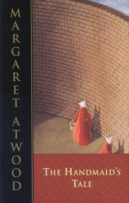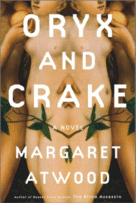Interview With Margaret Atwood
 Margaret Atwood was born in Ottawa in 1939, and grew up in northern Quebec and Ontario, and later in Toronto. She has lived in numerous cities in Canada, the U.S., and Europe.
Margaret Atwood was born in Ottawa in 1939, and grew up in northern Quebec and Ontario, and later in Toronto. She has lived in numerous cities in Canada, the U.S., and Europe.She is the author of more than thirty books - novels, short stories, poetry, literary criticism, social history, and books for children.
Atwood's work is acclaimed internationally and has been published around the world. Her novels include The Handmaid's Tale, Cat's Eye, The Robber Bride, Alias Grace and The Blind Assassin. She is the recipient of numerous honors, such as The Sunday Times Award for Literary Excellence in the U.K., the National Arts Club Medal of Honor for Literature in the U.S. and the Le Chevalier dans l'Ordre des Arts et des Lettres in France. She was the first winner of the London Literary Prize. She won the Booker Prize for her novel The Blind Assassin. She has received honorary degrees from universities across Canada, and one from Oxford University in England.
Margaret Atwood lives in Toronto with novelist Graeme Gibson.
Most of your previous novels have female protagonists. Was it a conscious decision to have a male protagonist for Oryx and Crake, or did Snowman simply present himself to you?
Snowman did present himself to me, yes, dirty bed sheet and all. For this novel, a woman would have been less possible. Or let's say that the story would have been quite different. If we are writers, we all have multiple selves. Also, I've known a lot of male people in my life, so I had a lot to draw on.
When The Handmaid's Tale was published, Contemporary Authors listed your religion as "Pessimistic Pantheist," which you defined as the belief that "God is everywhere, but losing." Is this still an accurate description of your spiritual philosophy?
 Click here for ordering information. |
You grew up among biologists; the "boys at the lab" mentioned in the novel's acknowledgments are the grad students and post-docs who worked with your father at his forest-insect research station on northern Quebec. Does being a novelist make you an anomaly in your family?
My brother and I were both good at science, and we were both good at English literature. Either one of us could have gone either way. My father was a great reader, of fiction, poetry, history—many biologists are. So I wouldn't say I was an anomaly in the family. We all did both. We were omnivores. (I read then—and still read—everything, including cereal packages. No factoid too trivial!) Science and fiction both begin with similar questions: What if? Why? How does it all work? But they focus on different areas of life on earth. The experiments of science should be replicable, and those of literature should not be (why write the same book twice)? Please don't make the mistake of thinking that Oryx and Crake is anti-science. Science is a way of knowing, and a tool. Like all ways of knowing and tools, it can be turned to bad uses. And it can be bought and sold, and it often is. But it is not in itself bad. Like electricity, it's neutral.
The driving force in the world today is the human heart—that is, human emotions. (Yeats, Blake—every poet, come to think of it—has always told us that.) Our tools have become very powerful. Hate, not bombs, destroys cities. Desire, not bricks, rebuilds them. Do we as a species have the emotional maturity and the wisdom to use our powerful tools well? Hands up, all who think the answer is Yes.
You've mentioned the fact that while you were writing about fictional catastrophes in Oryx and Crake, a real one occurred on September 11th. Did that experience cause you to change the storyline in any way?
 Click here for ordering information. |
Though the book's premise is serious, you included many wordplays and moments of deadpan humor. Was this difficult to achieve, or did it arrive naturally during the storytelling process?
My relatives are all from Nova Scotia. That's sort of like being from Maine. The deadpan humor and the skepticism about human motives are similar. The French have an expression, "Anglo-Saxon humor." It isn't the same as wit. It's dark; it's when something is funny and awful at the same time. "Gallows humor" is called that partly because highwaymen about to be hanged were much admired if they could crack a joke in the face of death. When things are really dismal, you can laugh or you can cave in completely. Jimmy tries to laugh, though some of the time he's out of control, as most of us would be in his position. But if you can laugh, you're still alive. You haven't given up yet.
What advice do you have for readers who would like to prevent your cautionary tale from coming true?
I've included a small list of books at the end of this Companion. There's lots of advice in there. If you're going to read just one book, and just one chapter of that one, try the last chapter of The Future of Life, by Edmund Osborne Wilson. It's kind of encouraging. I didn't read this book in its entirety until after I'd finished Oryx and Crake, but it's a very good summation of our current position on Earth as a species.
(May, 2003)
Posted with permission of the publisher.
